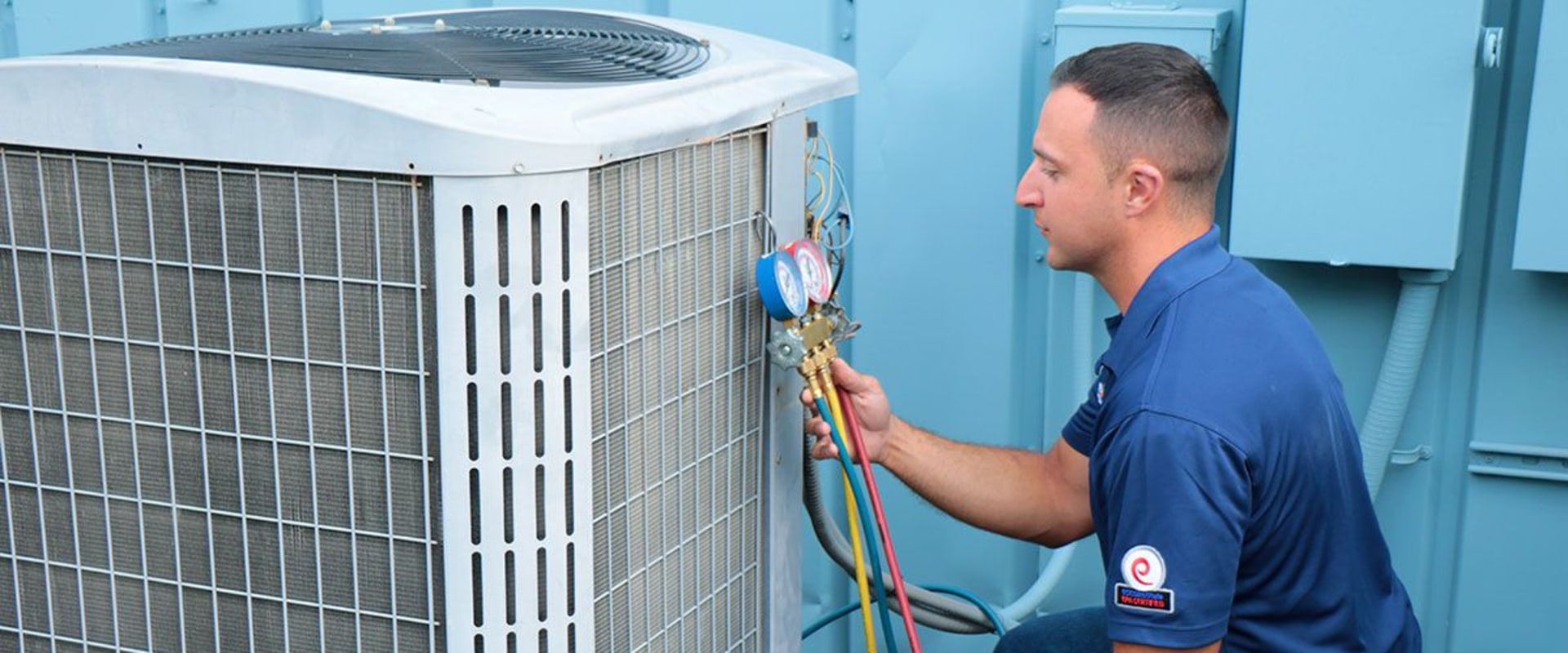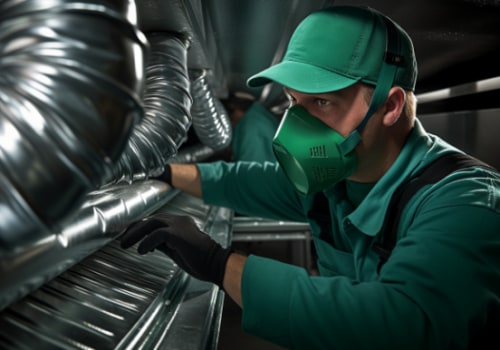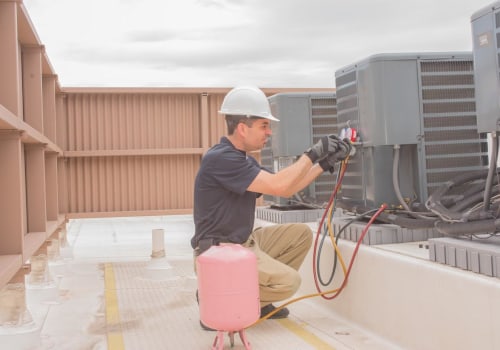HVAC UV Light Installation Services In Margate FL
HVAC UV light installation services in Margate, FL offer a solution for improving indoor air quality and reducing the risk of respiratory illnesses. With the increasing concern over airborne pathogens and pollutants, homeowners are seeking ways to create a healthier living environment.
This article will explore the benefits of HVAC UV lights, the process of UV light installation, and how to choose the right UV light system for your home.
Indoor air quality is a significant concern as it can impact our overall health and well-being. HVAC UV light installation services in Margate, FL provide an effective method for enhancing indoor air quality by eliminating harmful microorganisms present in the air handling units. These UV lights work by emitting ultraviolet rays that target bacteria, viruses, mold spores, and other allergens.
By neutralizing these pathogens, HVAC UV lights help reduce the risk of respiratory illnesses such as asthma attacks or allergies.
Creating a healthier living environment is essential for homeowners looking to improve their overall well-being. Installing HVAC UV lights not only improves indoor air quality but also contributes to maintaining a clean and safe environment within your home.
The process of installing these lights involves integrating them into your existing HVAC system, ensuring that all airflow passes through them to receive maximum germicidal exposure. By choosing reliable HVAC UV light installation services in Margate, FL, you can ensure that your home's ventilation system is efficiently equipped to eliminate harmful microorganisms and provide cleaner air for you and your family.
Understanding the Benefits of HVAC UV Lights
The advantages of integrating HVAC UV lights into residential and commercial systems can be comprehended through an objective examination of their potential benefits.
One of the key advantages is the effectiveness of HVAC UV lights in purifying the air by neutralizing harmful microorganisms such as bacteria, viruses, and mold spores. These lights emit a specific wavelength that damages the DNA structure of these microorganisms, rendering them unable to reproduce and therefore reducing their presence in the air. This not only improves indoor air quality but also helps prevent the spread of diseases.
To maintain optimum performance, it is essential to follow proper UV light maintenance tips. Regular cleaning is necessary to ensure that dust and debris do not accumulate on the surface of the bulbs or fixtures. Accumulation can reduce their effectiveness in emitting UV light and may even block it completely.
Additionally, periodic replacement of bulbs should be carried out according to manufacturer guidelines to maintain optimal output levels. Since different models have varying lifespans, it is important to consult with professionals or refer to product documentation for accurate information regarding replacement intervals.
Understanding the benefits of HVAC UV lights requires an objective analysis of their efficacy in improving indoor air quality by neutralizing harmful microorganisms. The ability of these lights to damage DNA structures prevents bacteria, viruses, and mold spores from reproducing and eliminates them from circulating within enclosed spaces.
However, it is crucial to adhere to proper maintenance practices such as regular cleaning and timely bulb replacements for consistent performance. By incorporating HVAC UV lights into residential and commercial systems along with appropriate upkeep measures, individuals can experience cleaner and healthier indoor environments while minimizing the risk of airborne illnesses.
Improving Indoor Air Quality with UV Light Installation
One effective method for enhancing the quality of indoor air involves the implementation of ultraviolet technology. HVAC UV light installation is a popular choice among homeowners and businesses looking to improve their indoor air quality.
These lights are installed within the HVAC system and work by emitting ultraviolet radiation that kills or neutralizes harmful bacteria, viruses, and other microorganisms in the air. By doing so, they help to reduce the spread of airborne diseases and allergens, creating a healthier environment for occupants.
In addition to improving indoor air quality, HVAC UV lights can also have a positive impact on energy efficiency. When installed properly, these lights can eliminate organic build-up on cooling coils and other components of the HVAC system. This build-up not only reduces airflow but also decreases the system's efficiency by causing it to work harder to maintain desired temperatures. By eliminating this build-up, UV lights can help increase energy efficiency and lower utility costs.
Furthermore, HVAC UV light installation offers cost-effective solutions for maintaining clean indoor air. Compared to other methods such as frequent filter replacements or chemical treatments, UV lights require minimal maintenance once installed. They provide continuous disinfection without the need for regular manual intervention or additional expenses associated with replacement filters or chemicals. This makes them an economical long-term solution for improving indoor air quality while keeping operational costs low.
Overall, incorporating UV light installation into HVAC systems is an effective way to enhance indoor air quality while increasing energy efficiency and reducing costs. These lights offer a non-intrusive method of killing or neutralizing harmful microorganisms in the air, resulting in cleaner and healthier environments for occupants.
Additionally, by preventing organic build-up on HVAC components, they promote optimal system performance and lower utility bills. With their cost-effective nature and long-term effectiveness, HVAC UV light installations prove to be an attractive option for those seeking improved indoor air quality in Margate FL.
Reducing the Risk of Respiratory Illnesses
Reducing the risk of respiratory illnesses can be achieved by implementing effective methods to improve indoor air quality.
For example, a study conducted in a school environment found that the installation of air purification systems resulted in a significant decrease in respiratory symptoms among students and staff, demonstrating the importance of proactive measures in creating healthier environments.
These air purification systems often utilize UV light technology to kill pathogens and prevent disease transmission.
UV light has been proven to be highly effective in killing various pathogens, including bacteria, viruses, and molds. When installed within HVAC systems, UV lights help eliminate harmful microorganisms from the air circulating through the system. As these microorganisms are exposed to UV light, their DNA is damaged or destroyed, rendering them unable to reproduce or cause harm. This not only reduces the risk of respiratory illnesses but also helps maintain cleaner indoor air quality overall.
Furthermore, UV light installation services play a crucial role in preventing disease transmission within indoor spaces. Airborne pathogens such as influenza viruses can spread rapidly through close contact or contaminated surfaces. However, with the continuous exposure to UV light provided by these installations, many pathogens are effectively neutralized before they have a chance to infect individuals sharing the same space. By targeting and eliminating these microscopic threats at their source – the HVAC system – UV light installation services act as an additional layer of protection against respiratory illnesses.
By implementing proactive measures such as installing air purification systems with UV lights, the risk of respiratory illnesses can be significantly reduced. Scientific studies have shown that such installations lead to decreased respiratory symptoms among individuals exposed to improved indoor air quality. The effectiveness of UV lights in killing pathogens further enhances their ability to prevent disease transmission within enclosed spaces.
Therefore, it is essential for individuals and institutions alike to consider HVAC UV light installation services as part of their efforts toward creating healthier environments and minimizing respiratory health risks.
Creating a Healthier Living Environment
Creating a healthier living environment requires implementing proactive measures to improve indoor air quality and minimize respiratory health risks.
One important aspect of achieving this is reducing allergens in the home. Allergens such as pollen, dust mites, pet dander, and mold can trigger allergies and asthma symptoms. To effectively reduce allergens, it is essential to keep the home clean and well-ventilated.
Regular vacuuming with a HEPA filter can help remove allergens from carpets and upholstery, while frequent dusting can prevent their accumulation on surfaces. Additionally, washing bedding frequently in hot water can help eliminate dust mites.
Another crucial step in creating a healthier living environment is preventing mold growth. Mold not only damages buildings but also poses significant health risks, particularly for individuals with respiratory conditions or weakened immune systems.
To prevent mold growth, it is important to control moisture levels in the home. This can be achieved by promptly addressing any leaks or water damage and ensuring proper ventilation in areas prone to high humidity, such as bathrooms and kitchens. Using dehumidifiers or air conditioners with built-in humidity controls can also help maintain optimal moisture levels indoors.
In addition to these measures, installing an HVAC UV light system can further enhance indoor air quality by eliminating harmful microorganisms that may circulate through the HVAC system. UV light has been proven effective at killing bacteria, viruses, and molds that may be present in the air ducts or on cooling coils.
By incorporating UV lights into the HVAC system, homeowners can ensure cleaner air throughout their living spaces and reduce the risk of respiratory illnesses caused by airborne pathogens.
Overall, creating a healthier living environment involves actively reducing allergens and preventing mold growth within the home.
By implementing regular cleaning routines, maintaining proper ventilation and moisture control practices, as well as considering advanced technologies like HVAC UV light systems installation services in Margate FL residents can significantly improve indoor air quality and protect themselves against respiratory health risks associated with poor air quality.
These proactive measures can contribute to a healthier and more comfortable living environment for all occupants.
Exploring the Process of UV Light Installation
The process of incorporating UV light technology into the home's ventilation system is akin to installing a shield against airborne pathogens, fortifying the indoor environment, and safeguarding respiratory health.
When exploring costs associated with UV light installation, it is important to consider both the initial investment and long-term savings. The upfront expenses may vary depending on factors such as the size of the HVAC system, the number of UV lights required, and any additional equipment or labor needed for installation.
Assessing the effectiveness of UV light installation involves understanding how these systems work. UV lights emit a specific wavelength that can kill or deactivate microorganisms such as bacteria, viruses, and mold spores. As air passes through the HVAC system, it is exposed to these ultraviolet rays, reducing the number of harmful particles circulating in the air. However, it is essential to note that while UV lights can significantly reduce microbial growth in HVAC systems, they are not a standalone solution for improving indoor air quality.
In addition to considering costs and effectiveness when exploring UV light installation services in Margate FL, homeowners should also take into account maintenance requirements. Like any other component of an HVAC system, UV lights need regular cleaning and occasional replacement to ensure optimal performance. By adhering to manufacturer guidelines and working with experienced professionals during installation and maintenance processes, homeowners can maximize the benefits of incorporating this technology into their homes' ventilation systems.
Choosing the Right UV Light System for Your Home
When selecting an appropriate UV light system for residential use, it is crucial to consider factors such as the size and design of the ventilation system, the desired level of microbial control, and the compatibility with existing HVAC components.
One important consideration is the effectiveness of UV light in controlling microbial growth. UV lights are known to be effective in reducing the population of certain microorganisms, including bacteria and mold spores. However, their effectiveness can vary depending on factors such as exposure time and intensity of the UV light. It is recommended to choose a UV light system that has been tested and proven to effectively control microbes in residential settings.
Another factor to consider when choosing a UV light system is maintenance requirements. Like any other component of an HVAC system, UV lights require regular maintenance to ensure optimal performance. This includes cleaning the bulbs or replacing them when necessary. It is important to choose a UV light system that allows for easy access and maintenance, as this will make it more convenient for homeowners to keep up with regular upkeep tasks.
In addition to maintenance, compatibility with existing HVAC components should also be taken into account when selecting a UV light system. Different HVAC systems have varying configurations and sizes, so it is important to choose a UV light system that can be easily integrated into the existing setup without causing any disruptions or inefficiencies. Consulting with an HVAC professional can help determine which type of UV light system would be most suitable for your specific home's ventilation system.
Choosing the right UV light system for your home involves considering factors such as its effectiveness in controlling microbes, maintenance requirements, and compatibility with existing HVAC components.
By taking these considerations into account, homeowners can ensure they select a high-quality and efficient UV light system that will effectively improve indoor air quality and reduce microbial growth within their homes.
Finding Reliable HVAC UV Light Installation Services in Margate, FL
Reliable and professional providers of HVAC UV light installation services can be found in Margate, FL, offering expertise in integrating UV light systems into residential ventilation setups. These technicians are well-trained and experienced in handling the installation process with precision and efficiency. By utilizing their expertise, homeowners can ensure that their UV light system is installed correctly and functions optimally.
When considering the cost of UV light installation, it is important to weigh the benefits it provides. While there may be an initial investment involved, the long-term advantages outweigh the expenses. HVAC UV lights help eliminate harmful microorganisms such as bacteria, viruses, and mold spores from circulating through the air ducts of a home. This not only improves indoor air quality but also reduces health risks associated with these contaminants.
In addition to improved air quality, homeowners can also benefit from energy savings with HVAC UV light installation. The presence of these lights prevents the buildup of organic growth on cooling coils and other components within the ventilation system. This allows for better heat transfer efficiency and reduces energy consumption Reliable HVAC technicians specializing in UV light installations are available in Margate, FL to provide professional services for integrating these systems into residential ventilation setups. Despite any initial costs involved, investing in a UV light system brings numerous benefits such as enhanced indoor air quality and energy savings over time. Homeowners can trust these professionals to handle the installation process efficiently while reaping the long-term advantages provided by this technology.
Frequently Asked Questions
What is the cost of HVAC UV light installation services in Margate, FL?
The cost of HVAC UV light installation services in Margate, FL can vary depending on factors such as the size of the system and specific requirements. A cost comparison and benefits analysis can help determine the best option.
Are there any potential side effects or risks associated with UV light installation for HVAC systems?
The potential health risks associated with UV light installation for HVAC systems include skin and eye irritation, as well as the production of ozone. Furthermore, the effectiveness of UV light in killing bacteria and viruses is still being studied.
How long does the installation process typically take?
The installation process for UV lights in HVAC systems typically takes a few hours. It is important to consider the benefits of using UV lights, such as improved indoor air quality and reduced microbial growth, when choosing the right UV light for installation.
Do HVAC UV lights require any regular maintenance or replacement?
HVAC UV lights do require regular maintenance and replacement. Maintenance requirements include cleaning the bulbs and replacing them when their lifespan ends. The lifespan of UV lights typically ranges from 9,000 to 14,000 hours.
Can HVAC UV lights be installed in all types of heating and cooling systems, or are there any limitations?
The installation of HVAC UV lights is subject to certain limitations depending on the type of heating and cooling system. However, their benefits, such as improved air quality and reduced microbial growth, make them a worthwhile addition in many cases.




